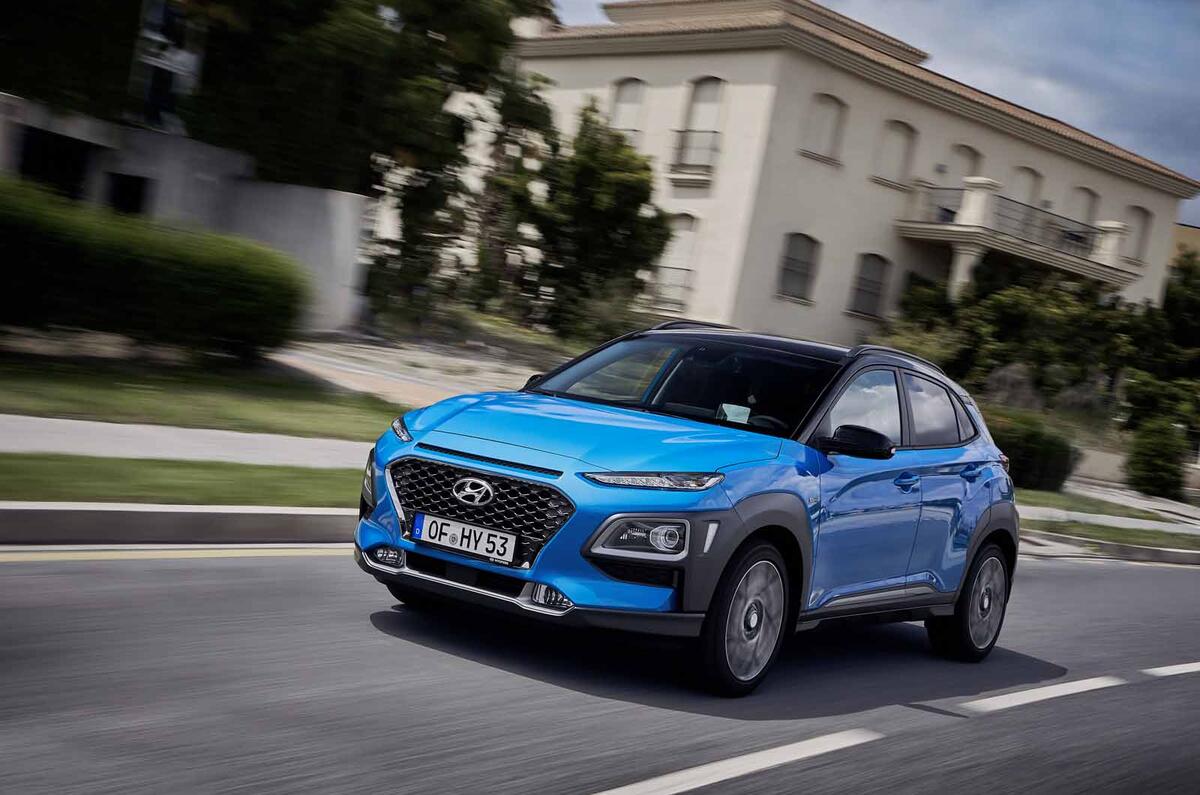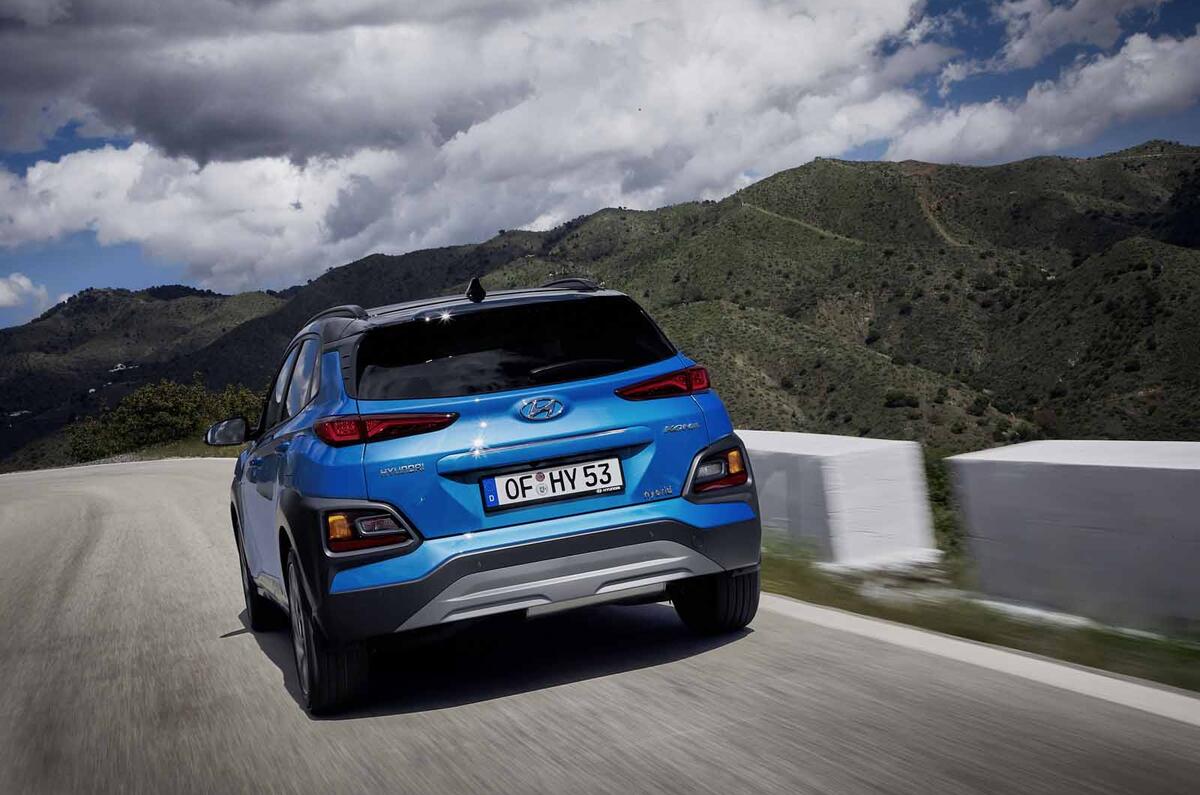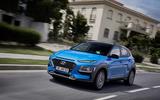The new Hyundai Hyundai Kona Hybrid will be priced from £22,495 when it goes on sale in the UK near the end of September.
The latest version of the Korean firm’s compact SUV, which joins the existing petrol, diesel and fully electric models, will be offered in three trim levels, all of which will use the same 1.6-litre petrol-electric powertrain.
That unit, taken from Kia’s larger Kia Niro, makes 104bhp on its own and is mated to a 43bhp electric motor also powering the front wheels.
Both are linked through a six-speed dual-clutch automatic gearbox and a small (1.56kWh) lithium ion battery that recharges through coasting and braking. Total system output is 139bhp, with a combined torque figure of 195lb ft. That’s sufficient for a 0-62mph time of 11.2sec on the smallest wheel size, and a maximum speed of just under 100mph.
The hybrid is considerably more frugal on paper than the normal petrol equivalents, managing a claimed 72mpg (66mpg on 18in wheels) and CO2 emissions of 90g/km (99g/km on 18in wheels). For comparison, Hyundai claims the base 1.0 T-GDI petrol engine manages 54.3mpg combined.

Entry-level Kona Hybrid SE models feature climate control, 16in wheels with a design bespoke to the hybrid version, special badges and unique white accents on the air vents and gear level. There is a 7in touchscreen with Apple CarPlay and Android Auto connectivity, rear parking sensors and camera and lane-keeping assist.
The mid-level Kona Hybrid Premium starts at £24,295, and additions include 18in wheels, a 10.25in touchscreen, Krell sound system, keyless entry, privacy glass and wireless smartphone charging.
The top Premium SE trim level is priced from £27,195 and includes the likes of LED front and rear lights, standard autonomous emergency braking, heated and ventilated leather seats and a head-up display.






























Join the debate
Add your comment
Maybe 8 years to pay for itself. Emmmmm
'Kona Hybrid Premium' starts at £24,290, whereas the 1.0t ICE Premium is £19.9k.
So basically how long will it take to get your £4,300 back by saving £25% in fuel costs for the private buyer. £500 a year makes it over 8 years pay back !!!
Emmmmm
The hybrid is however the cheapest way to get an automatic Kona.
Automatically expensive
That might be so, but the problem is it's not longer a cheap'ish Korean car anymore.
Cheapish cars
I don’t think either Hyundai or Kia are that bothered about the ‘cheap’ish’ car market. That will now belong to the Chinese manufacturers like MG.
It's back to the drawing board.
Just wondering if you've had any experience of buying a new car?
1: Most people these days use PCP over 2 or 3 years which dismisses your theory.
2: And for the rest of us like myself who prefer to pay cash - if I buy two cars, one at £20k and the other at £25k, then when I come to sell them, the more expensive car is generally worth far more than the cheaper. In otherwords, your calculations are based on buying the car and never selling it. Very few brand new cars are ever bought and kept for 8 years!
Thanks for the concerns over my views
Sorry you've been wondering about me. Yes I've bought plenty of new, used and motorcycles too (probably more than you)
1. PCP price is affected by the initial cost, surely even you can understand that. Also, not everyone is a PCP buyer which is why I mentioned private buyer early on.
2.You've proved my point but can't realised it. The car might indeed sell for a bit more in 5-6 years time but not £2k more, the same was said of diesel cars, look what happened there! Also, what will the condition of the battery be like in 6 years
3. Show me your figures of how you'll not only get the £4,300 back but also go onto make this car a wise purchase not forgetting it's poor'ish performance for a £25k car
xxxx wrote:
Whilst not wanting to bicker over points but I had an insight and a crz at about 7 yes old, both were technically full hybrids whatever that is and both had batteries in perfect condition, if you do a little research as I did before buying you will find that even for the older civic hybrids the batteries are still in good shape and working, mild hybrids are these 48 volt systems I think where as this Hyundai is very similar in concept of not practice to a normal, non plug in, Prius, Honda's ima was totally different but still a full hybrid though I'd question that for my old crz.
On a different note when referring to your relatives Audi, what is the abbreviation cod?
EV Kona, UK at least
When you say 'supply restricted' for the Electric version you actually mean not available till sometime in 2020. Which is a bit of scam as I think for the price it was the best EV available.
Back to the car in question. Mild Hybrids may make sense but you have to do the maths first, (and put up slower accelation in this case), be great for Autocar to run the 3 versions for a day but a 1.5kWh barely seems worth the effort of installation.
xxxx wrote:
This is basically the Hyundai equivalent of a Kia Niro hybrid. It's a full hybrid, and it only has a small battery pack as it's not intended to run for any great length of time on the battery; it's there to utilise the relatively low-output petrol engine more effectively.
I've got an Ioniq with the same drivetrain and it's very effective indeed.
captainaverage wrote:
Same drive train as the Niro different platform though the Niro and Hyundai Ioniq are the same platforms. I had a Niro Hybrid as a hire car recently for covering 600 miles - it averaged 50mpg over the course of combined driving. We better in town when it ran in electric mode. The gearbox is jerky though.
50 mpg, nothing special
All that tech and cost outlay and still only 50 mpg, not great, 1.5 COD Golf would equal that that and my old father in laws A3 COD got 53 mpg over 40,000 miles. Both cars probably quicker to
Run a 1.5kwh battery ?
Emm I don't think it is a full hybrid (I'd call it a mild hybrid), in the sense it can run on the battery alone. If you think it can just how far can it go on a 1.5kwh battery?